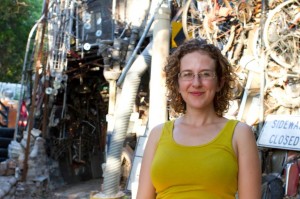Foodie and Food Nerds are a few terms that have come to describe individuals with a passion for food. More than ever, people’s obsession with food has come to the forefront with full force. New media and other online tools have allowed for people to share more recipes, pictures and information about food, opening up an entirely new conversation that only used to exist on traded recipe cards. Will Burdette, Program Coordinator at the Digital Writing and Research Lab at UT Austin and is involved with new media tactics everyday by creating ways for students to learn new and innovative ways to write using new media. Burdette also has a focus on food, his podcast NoSatiation, examines people’s desire to be satisfied with food.

Burdette, accompanied by Addie Broyles, Food Writer for Austin American Statesman, Mary Helen Leonard, an online cooking class instructor and avid food blogger and Hilah Johnson of the Hilah Cooking Web Show have combined their love of food and the ever-changing innovations of new media in the SXSWi panel titled “Eating to Live Online: Virtual Food and Real Life”.
Burdette, the organizer for the panel was inspired by the community he joined with the creation of his food podcast NoSalation. “The food community is always doing interesting things online.” This community can get easily exaggerated and be overwhelming for people when enhanced by media elements. Through this panel, the group hopes to show that a smaller, local discussion can have more significance to individuals, and that new media plays a huge part in this. Being able to write and talk about food, or any interest, allows for people to gather and organize their thoughts and write them down, as well as share whatever information they have. “The food community can be an inspirational and aspirational function for many people,” Burdette said. “There has to be a balance, some people can get easily disheartened because of lack of time.” However, building a community, especially through food, can be easily established with new media endeavors. Instead of individuals sitting at home with their computer, they can engage with others who may have similar interests. “Everyone’s got to eat,” claims Burdette, “being involved in an online community allows you to gain more perspective and have more interesting conversations about a worldwide topic.”
The inspiration for this panel stems from what the group has experienced in previous SXSW panels. Broyles wanted to take into consideration the fact that many panels have covered general food topics such as publishing virtual cookbooks, food apps and sustainability. “We wanted something new to talk about,” said Broyles. Her section of the panel will focus on what happens when people in the food world rely too heavily on technology. “Food is entertainment, but we need to remember there are people who don’t have food to eat,” she remarked.
All aspects of technology have changed the food industry from a niche market to an overarching demographic. This panel will be great for those interested in this relationship between food and technology, as well as those who may be turned off by the current food culture. The discussion on extremes of food culture and how new media has altered the conversation is surely to be intriguing to all audiences alike.


